Editor's note: This story first appeared in the April 2024 issue of Chess Life Magazine. Consider becoming a US Chess member for more content like this — access to digital editions of both Chess Life and Chess Life Kids is a member benefit, and you can receive print editions of both magazines for a small add-on fee.
This month sees the publication of two new books from GM Maurice Ashley. The first, Move by Move: Life Lessons On and Off the Chessboard, is a thoughtful mediation on the game we love, its broader relevance, and its powerful lessons. You’ll find an excerpt accompanying this interview.
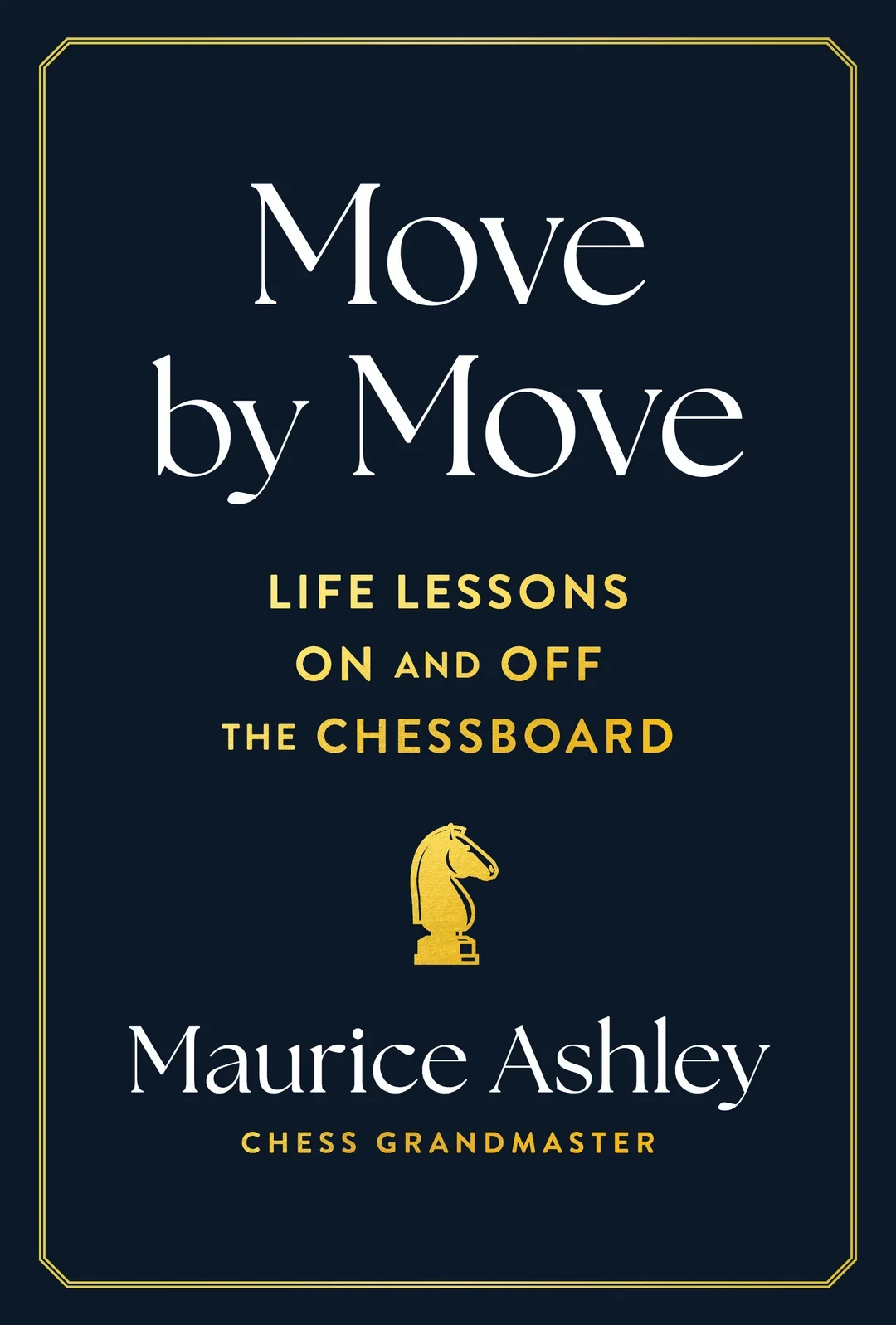
The second, The Life-Changing Magic of Chess: A Beginner’s Guide with Grandmaster Maurice Ashley, is a youth-oriented introduction to the game, illustrated by Denis Angelov. Both titles are scheduled to hit bookshelves on April 2, and should be widely available by the time you read these words.
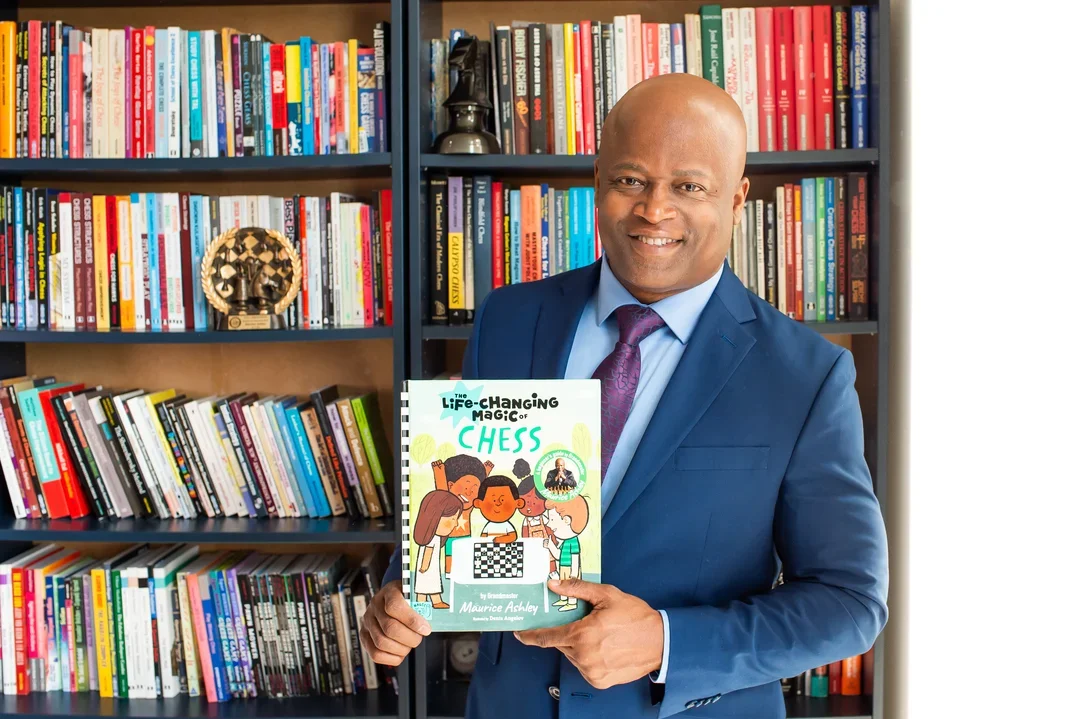
To honor this accomplishment, we have asked Newbery Honor winning author Steve Sheinkin, who is (shhh!) collaborating with Ashley on a future project, to talk through some of the themes in these books with Ashley. The result is a wide-ranging discussion that will make you think about just what you’re doing when you push those pawns. ~ed.
Steve Sheinkin: I love a good chess superhero origin story — you know, six-year-old Garry Kasparov looking at a chess board and solving a puzzle that’s got his father stumped. For a grandmaster, you didn’t really have an experience like that until relatively late, right? About 14?
Maurice Ashley: I learned how to play the game when I was a kid in Jamaica, when I was about eight or nine years old. And I remember beating an older boy, a friend of my brother’s, because I figured out the Scholar’s Mate.
No one showed it to you?
No, I just saw it. If I could have seen me then, I’d have taken that kid to the side and said, “This kid’s going to be a player.” But to me back then it was just a trick in the game; I didn’t think I had done something special. It wasn’t until I was 14, in high school in Brooklyn, that I saw a friend playing, and I thought I knew what I was doing. But I didn’t have a clue.
So you got crushed.
First in school. Then in Prospect Park. But especially to members of the Black Bear School. (The Black Bear School was a group of mostly African American males in Brooklyn in the 1970s and 80s who studied chess very seriously. ~ed.) This last group was the most influential on my chess — they taught me how to fight to the bitter end and to really study intensely, not by any formal lessons, but by just crushing me mercilessly. Truly the school of hard knocks.
That lesson fits in so well with your new book, Move by Move, which is all about how thinking like a chess player can change your life. One of the main points you make is how much we can learn from our mistakes, our imperfections — our losses. That’s hard to appreciate as a teen, but maybe you did it without thinking about the life lesson.
At first my main motivation was, “I just wanted to whip my friend’s a--.” Then I found a chess book in the library — I didn’t know there were books on chess. That entranced me. I started playing every day after school, reading at night. I was just hooked. And I had no idea that the odds were long of ever becoming a decent player.
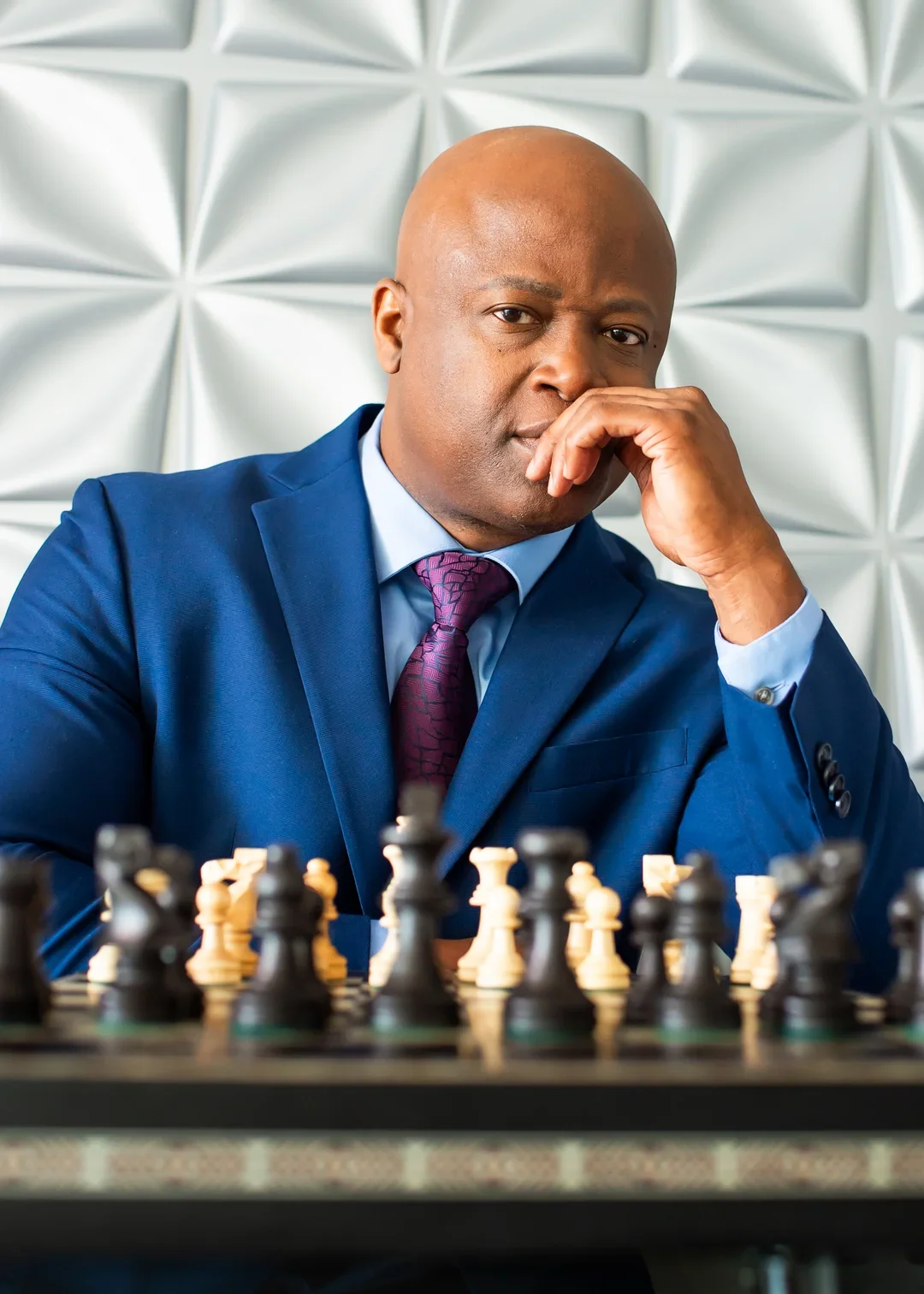
There’s a great moment you describe in Move by Move where you realize, as a pretty new player, that you can see entire games in your head without looking at the board. (Move by Move, 32) Did you stop and think, “Wait a minute, I might have a gift for this”?
No, no. The entire time I was studying chess, it was pure obsession, wanting to learn more, see more. And the other thing was the competitive mindset — if other people can beat you, you’re not that good. I knew I had a lot of work to do. That’s true of everyone, including grandmasters. As I talk about in the book, we’re all advanced beginners.
That’s one of my favorite things in the book, that insight. The power of humility. Another thing jumped out at me, because at first it seems like a contradiction — but maybe in your thinking it’s not. As you say, chess is meant to be fun, it’s meant to provide a lifetime of joyful entertainment. But you learn most by losing. And most people, especially elite competitors, hate losing. Is that a contradiction?
There’s depth in paradox. To me, there’s no need to search for holistic, coordinated truth. And so, I appreciate losing. I don’t want to lose, but I appreciate it when it happens.
But is it really fun?
Yes, even with the torture you might go through, even sitting there suffering for hours before finally losing in the most embarrassing way, it’s still satisfying in the end. There’s so much you gain — if you come away and say, “Wait, I just learned something. I just took myself to another level.” If you define yourself only by winning, it’s a sad state for you. Winning is a byproduct of effort, dedication, focus, passion. But so is losing.
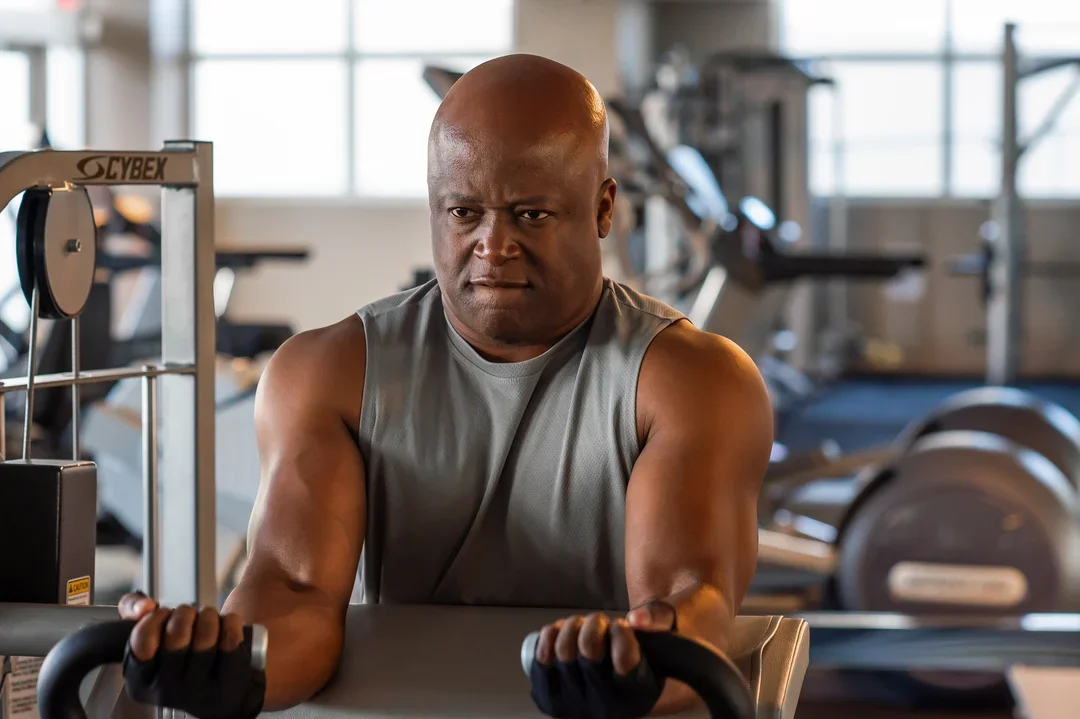
And you can learn from all of it.
All of it. As long as you have that mindset.
“Flexibility is one of the most difficult qualities to develop in chess and life,” you write. (Move by Move, 33) New players are told to control the center, castle early, don’t bring out your queen too soon. But you have to be ready for exceptions, for times you need to look past the basic rules. Is that something you can apply to life as well?
Yep. As I said, I’m not seeking absolute truth. As a person, I seek the best insights that I can get. And sometimes one truth competes with another. That’s one of the biggest lessons chess teaches. Sometimes one truth competes with another truth, and you just can’t do the thing that’s supposed to work here.
There’s a great book called The Half-Life of Facts. What you thought was a fact lasts only so long — the tallest building in the world, for example. I find insights far more valuable than facts. It’s similar to what Einstein says: “Imagination is more important than knowledge.”
You talk a lot about professional athletes, quoting the likes of Kobe Bryant and the chess-playing tennis star Carlos Alcaraz. As a competitive player, aspiring to reach grandmaster level, did you approach chess like an athlete?
Absolutely. You’re in the gym or doing martial arts. For me it was aikido that really put me over the top in terms of becoming a grandmaster.
Where do you fall in the “Is chess a sport?” debate?
It’s sport, it’s science, it’s art... it’s also war. You have an opponent who is trying to destroy you. Not only your best ideas, but your spirit too. Bobby Fischer said, “I like the moment when I crush a man’s ego.” So you may say, “Well that’s not really a sport.” Well okay, sit across from me and see how it feels when you’re done getting a train run over your face. That’s what you’re up against, so you have to train for stamina, you have to train for intensity, focus. If you’re not fit enough, I’ll take you into the sixth hour and we’ll see how you feel. That’s what Magnus Carlson does.
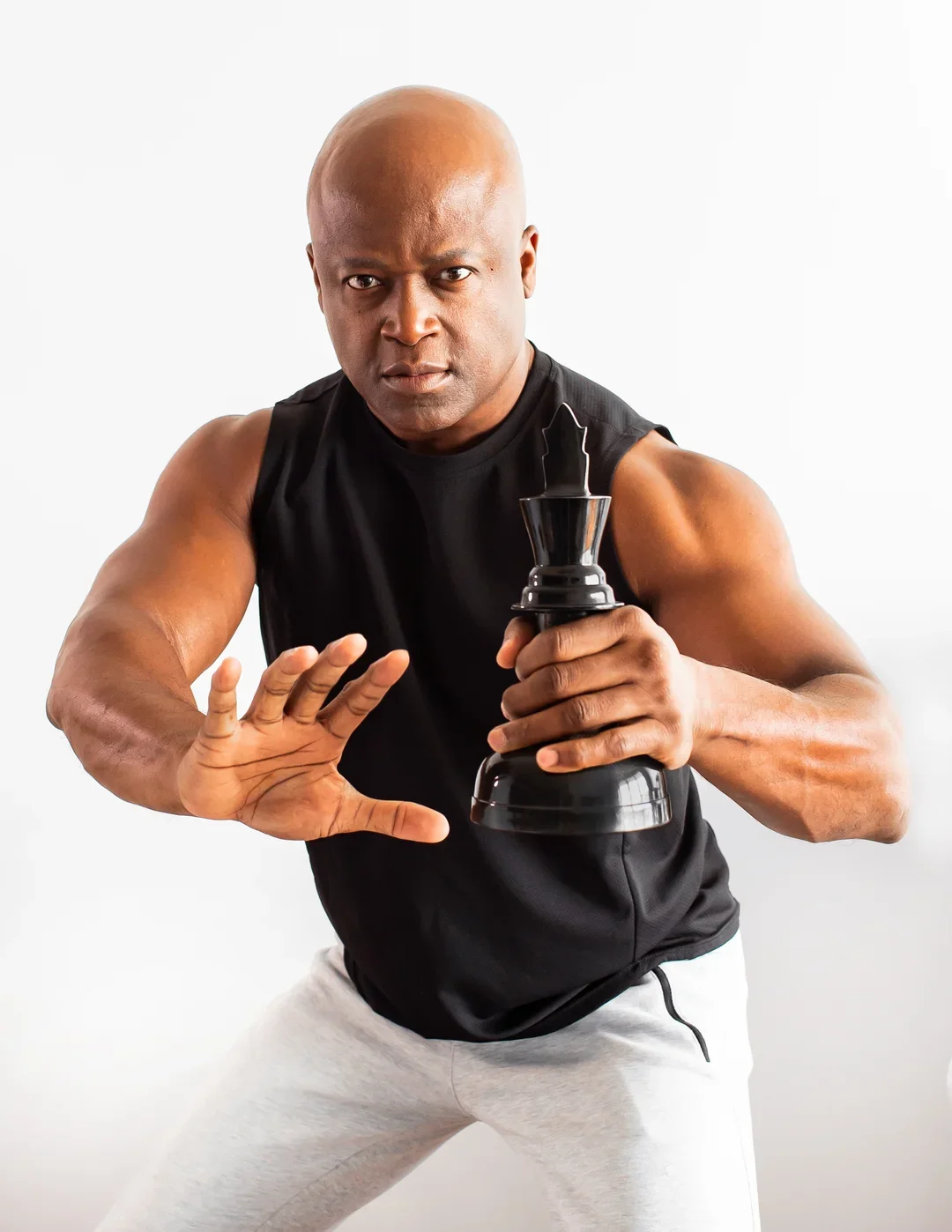
I’ve seen studies that show top chess players at tournaments burn calories at rates comparable to Olympic athletes.
[laughing] I’m not sure I buy that, exactly. Because I wasn’t exactly losing a ton of weight at tournaments. But it is absolutely taxing on the body and the nervous system.
Well, one way or another you made it. You battled your way up through the ranks, and at the age of 33 you were in a tournament in New York, needing to win one more game to get the grandmaster title.
Yes. In the eighth round against Romanian IM Adrian Negulescu. March 14, 1999.
Yeah, I figured you might remember. In your book you say that you won the game with a “beginner’s play.” (Move by Move, 164) But that’s hard to believe. Would a beginner, or even a casual player like me, really have seen the winning move?
Oh, totally. He walked into something silly, because I was pressuring him from so many different directions.
Okay, so what happens then? You become a GM, what next? I want to picture some sort of ceremony, a secret initiation...
That would be so nice! No, it’s sort of anticlimactic, actually. There’s no hurrah, there’s no party, no money. You get a certificate and a pin in the mail from FIDE. But for me, I already got my reward, which was getting the final norm that I needed after all those years and years of trying.
And your life in chess has gone far beyond just competing. You’ve been a teacher. You’ve coached kids’ teams to national titles. You’re an ambassador of the game, traveling the world. You’ve done live commentary at world championship matches — and, most famously, at the showdown between Garry Kasparov and Deep Blue. And now you’ve got not one, but two, books coming out: Move by Move, and a kids’ book too.
Yes, the kids’ book is called The Life-Changing Magic of Chess. They both speak to my own journey, with an introduction to the joys of the game, and strategies that work on and off the board for any age. Both books come out on April 2. A coincidence, but it works out well.
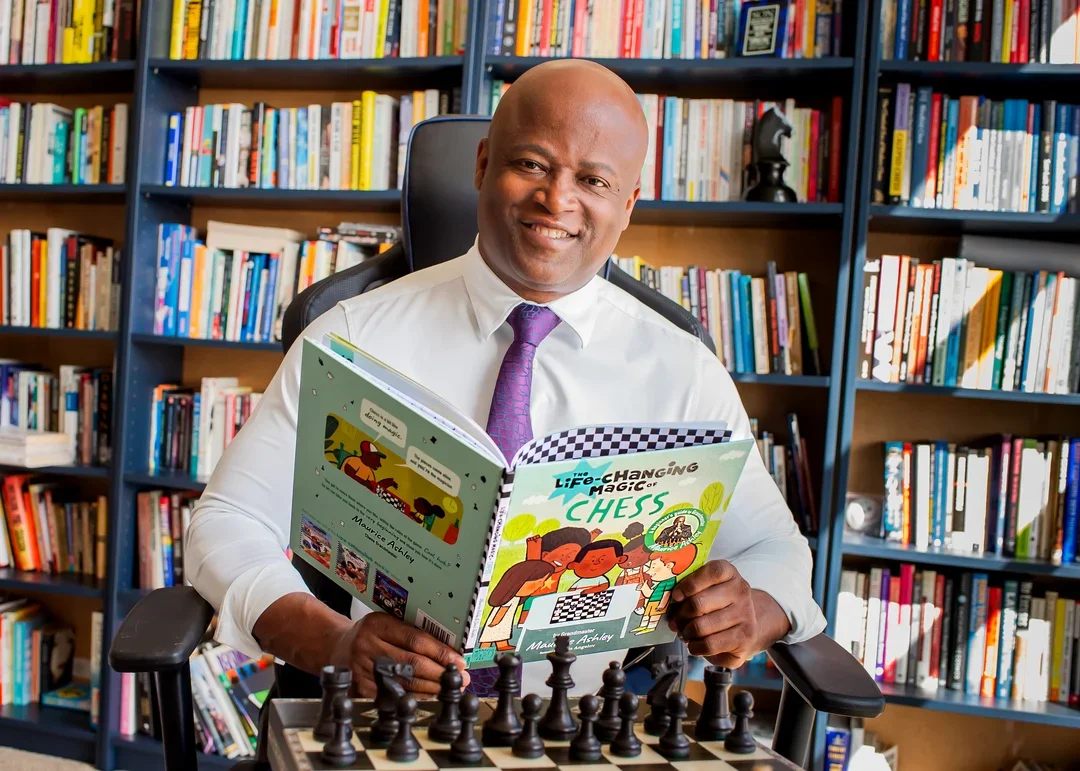
Chess wisdom for the whole family.
Absolutely.
Okay, so you have all of this going on. And yet you devote a chapter in Move by Move to the importance of setting aside your accomplishments — you urge us to “become like a child” and to “learn from beginners.” What can we learn from beginners?
It’s one of the best pieces of advice you can get. It’s really about being open, about the things you can see when you have a beginner’s mind. I’ll give you a specific example, something that happened very recently.
It actually started with a puzzle I was thinking of. The black king is in the middle of an empty board, let’s say e5. You have the white pieces and can place them wherever you want. Using the usual point system — pawns are one unit, knights and bishops three, and so on — what is the lowest number of points necessary to place the black king in checkmate?
That’s not something I can do in my head.
I thought I knew the answer. I lazily thought the answer was seven, basically a rook and two pawns, though it can actually be done using a total of just six points with a minor piece and three pawns.
I was talking about this to a number of amateur players in the Chessable offices in Barcelona, and a woman named Anna Khudayarova — she’s a graphic designer and is close to beginner as a chess player — she said, “Can’t you do it with all pawns?”
And I went, “Oh %*#$. Yeah, you’re right!” She didn’t even know what it looked like. And at first, we thought it was six, and we set it up and realized it was five.
And we were all stunned by the fact that this beginner, with her curiosity, said, “Can’t you just...”. And that’s what beginners do. They ask naïve questions, but there’s gold in there.
As someone who loves creating chess studies and puzzles, that question has opened up a new vista of possibilities, so now I’ve been creating other puzzles based on Anna’s idea of a position being interesting from a design point of view.
The fact that I was open to what a beginner could reveal to me is what led me down this path. And I think that’s the case in everything. You see something in a slightly different way — and if you’re open to it, you’ll learn something.
Not that you need more to do, but what other projects are you working on? What goals motivate you?
We talked about that game I won in March 1999. So March 2024 marks my 25th anniversary of becoming a GM, a huge day for me. I became the first African American to accomplish that title. When people asked me at the time, “How does it feel to become the first?” I said, “You know, it’s cool to be the first. But what excites me is that there’s going to be a second, a third, a fourth, and a 10th.” And 25 years later, I’m still the only one. For me, that’s a challenge. That’s unacceptable.
There are Black players around the world who have gotten the grandmaster title, but not in the U.S., and not in my native country, Jamaica. The U.S. currently has a couple of really strong young Black players. Brewington Hardaway has gotten two grandmaster norms, and he’ll be 15 years old this year. It’s very likely he’ll become a grandmaster by his 16th birthday. Tani Adewumi, born in Nigeria, has been in the U.S. since he was eight.
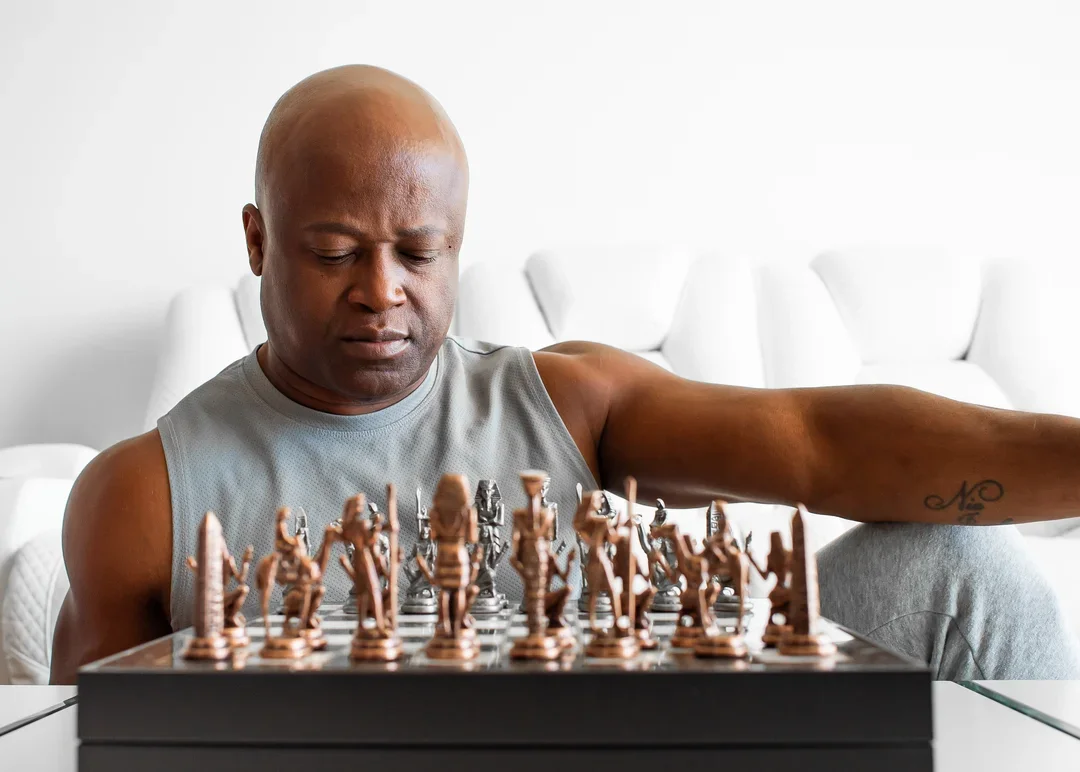
He’s an FM now, and he’s also got very good chances to become a grandmaster in the next few years. (Adewumi notched his third IM norm at the Southwest Class Championship in February, and only needs to raise his rating above 2400 to become an IM. ~ed.) So we have a couple who are on their way, but not enough, and no Black girls in that rarified air.
So lately I’ve really been focused on this. I’m starting to take on a few students. I’ve started working with the Jamaican government and their chess federation to create the next Jamaican grandmaster — or the first, really, because I’m a U.S. citizen. I plan to travel to various African countries too, and teach chess there, to train top juniors.
Is it easy to spot young talent? If you’re sitting with someone who’s seven or eight, can you pick out kids who have a gift for the game?
I don’t know that there’s a magic formula, but certain things have to be in place. They have to absolutely hate losing. But even though they hate losing, they keep coming back. That’s already a huge sign. And also, they love it, they love the game. They see chess and just want to eat it up. And then you hope that that kid is willing to do the work, to sit down and do 100 or even 1,000 puzzles over and over. Then you’ve got a live one. We’re looking for live ones.
So you can’t be a kid who likes to play a little chess one day, a little soccer the next day...
It’s nice to have diverse talents, that’s great. But it’s not the way to become a grandmaster, I’ll tell you right now. When the bug hits them, the obsession is inside, and they just want it — that’s where it really begins. And that kind of kid will let you know.
Then they too can start this lifelong journey, setting off into what’s still partly the unknown. You say in your book that no single chess player knows even 10 percent of what there is to know about the game. I was shocked by that.
Well, it’s easy to prove. The number of possible positions in chess is equal to 10 to the 120th power. Now, much of that is garbage, positions that don’t make any sense, but still — 10 to the 120th power! That’s greater than the number of atoms in the observable universe.
I see where you’re going. So take 10 percent of that number and it’s still far beyond human knowledge.
Exactly. How many zeroes do we have to take off before you get to us? To what mere mortals can hold in our heads? So actually, we’re not anywhere near knowing one 10th of what there is to know about chess.
It all comes back to that central lesson: You have to humble yourself. Try to learn a little bit every day.
Astrophysicist Neil DeGrasse Tyson said this to me — he said, “Maybe there’s a planet where they’ve already figured out chess, and chess to them is like tic-tac-toe.” We would be like children to them. And that’s okay, because we have fun, and we grow. And that’s what counts, having fun and growing. It’s not about the glory. It’s about the growth.
No matter where you are, you’re an advanced beginner at best. That’s a pretty powerful way to approach each day.
That’s the wisdom I get from chess.
Below is an excerpt from Move by Move: Life Lessons On and Off the Chessboard
Focus Is a Full-Time Job
"You don’t get results by focusing on results. You get results by focusing on the actions that produce results.”
—MIKE HAWKINS
“The successful warrior is the average man, with laser-like focus.”
—BRUCE LEE
“When you are preparing for a tournament, you have to treat it like the most important event in your life. But while you are playing that game — the most important of your life — that is when you have to just take it easy and just do it.”
—VISWANATHAN ANAND, FIFTEENTH WORLD CHESS CHAMPION
Human beings have a natural tendency to relax when things seem to be going really well. When people’s needs have been sufficiently met, it’s hard to see mental toughness as an imperative. We like to carve out a comfortable space for ourselves and then return to it again and again and again.
Chess players often suffer from this “sin of complacency.” Once we have built up a big enough advantage, our “sloth brain” kicks in and tells us that danger has passed and there is no longer a need to exert maximum effort. What we forget is that the exact opposite is going on inside the opponent’s head! They can hear the grim reaper knocking, and every bit of instinct to survive is coursing through their veins to stave off defeat. As Grandmaster Daniel Naroditsky describes it: “It is important to recognize that the defender has nothing to lose. Your opponent will do everything in his power to trick you, prolong the game, or pounce on your fatigue.”
Many years ago, I played a game against a lower-ranked opponent. I had made a huge mistake earlier in the game, and he had exploited it masterfully. I was in a seemingly hopeless endgame, two pawns down, with little to no chance of survival. My opponent’s eyes were lit up like a kid in a candy store. Defeating a grandmaster is a moment any player cherishes forever.
It was precisely at this moment that I took advantage of my opponent’s desire to exhale. Studying the board intently, I noticed the possibility of a devious trap that would stave off defeat. The chance of the play actually working was remote, and it was absurdly easy to stop if my opponent noticed it was coming. Knowing this, I proceeded to do my best Denzel Washington impression and act as though I could see the writing on the wall. I sighed just a touch more deeply, wrote my moves down with a little less care, and stared off into the distance with a look of hopelessness bordering on disgust. Reading my reactions as a man heading to the electric chair, my opponent gleefully made all the natural moves that should have forced my resignation. In his mind, the game was over and there was no longer any need to stay focused, buckle down, sniff out danger, or avoid traps. It wasn’t until he made the final natural move that allowed me to sacrifice a rook and force a stalemate that he suddenly realized that he had been tricked. Chess teaches brutally painful lessons.
My opponent’s behavior is an example of “the principle of least effort.” Simply stated, it postulates that in most situations people and animals will often choose the path of least resistance. Our brains and bodies naturally seek to conserve energy, and once we ascertain that intense effort is no longer needed to accomplish a goal, we have the tendency to shut down our emergency response systems in order to retain our valuable resources for future activities. There is no need to run at top speed if a light jog will get us to our destination just the same.
Even elite athletes have the tendency to get comfortable, even in the height of competition. The desire to keep playing at full tilt wanes as the goal seems more certain. (There’s a reason it’s called “a comfortable lead.”) One of the most famous examples of this in sports history occurred during the 100-meter finals at the 2008 Olympics in Beijing when legendary Jamaican sprinter Usain Bolt realized he was guaranteed to win gold. What did he do at his moment of triumph? He cruised to the finish line. He won, but calculations show that if he had maintained his speed, he would have clocked in at 9.55 seconds, a world record that would still be standing today.
Is there a way to fight the desire to relax when everything seems to be going well? Sort of. The human mind is constantly looking for ways to make life easier, so your sloth mind will always keep looking for the first exit to its mental sofa. As is often the case, we are our own worst enemy.
Though our awareness of our own tendencies won’t necessarily solve the problem, it at least allows us to try to fight against it with whatever tools we can muster. One such technique is to establish when and where we wish to remain hyper-focused. If I’m playing a long chess game, I want to remain in the zone the entire time. It’s the same for any athletic competition, musical performance, or sales pitch. This is not the case when I’m speaking to my children, lying on a beach, or salsa dancing for fun. Intense focus and concentration have a time and place.
A second tool is to monitor your overconfidence level. This is very difficult to do on your own, so it’s nice to have someone close to us who knows us well and can warn us when we seem to be getting too comfortable. Coaches often call timeout when they can see their team is just going through the motions. It’s up to the coach to remind the players of the dangers of complacency and reignite their will to play at full intensity.
One way to do this is to intentionally shift the goalposts by posing additional in-game challenges for yourself or your team. If you have a big lead by the end of the first half, the challenge might be to increase the lead in the second half by the same amount. The Golden State Warriors, led by coach Steve Kerr, have a special knack for flustering their opponents in the third quarter of games by playing with hyper-aggression and a killer mentality as soon as the game restarts. Instead of resting on their laurels, they attack with an increased sense of urgency as though the game itself were on the line in those first crucial minutes, even though there is a full half remaining. This style of “orchestrated desperation” when it doesn’t seem necessary helped them win four NBA titles in eight years.
It’s important to note that being hyper-focused is not the opposite of staying loose. Being too tense can kill effectiveness as much as losing focus can. Deep breathing or meditation techniques can calm the mind without causing focus to wane. Staying well-hydrated and getting enough rest are also positive ways to prepare the nervous system to maintain energy when the mind just wants to ease up and take a break.
We risk losing all our hard-won gains when we let our focus flag, sometimes for even an instant. The truth lies in the Zen proverb: “When walking, walk. When eating, eat.” In today’s hyper-distracted times, nothing could be simpler or more difficult.
Categories
Archives
- January 2026 (1)
- December 2025 (27)
- November 2025 (29)
- October 2025 (39)
- September 2025 (27)
- August 2025 (29)
- July 2025 (43)
- June 2025 (25)
- May 2025 (24)
- April 2025 (29)
- March 2025 (29)
- February 2025 (20)
- January 2025 (24)
- December 2024 (34)
- November 2024 (18)
- October 2024 (35)
- September 2024 (23)
- August 2024 (27)
- July 2024 (44)
- June 2024 (27)
- May 2024 (31)
- April 2024 (51)
- March 2024 (34)
- February 2024 (25)
- January 2024 (26)
- December 2023 (29)
- November 2023 (26)
- October 2023 (37)
- September 2023 (27)
- August 2023 (37)
- July 2023 (47)
- June 2023 (33)
- May 2023 (37)
- April 2023 (45)
- March 2023 (37)
- February 2023 (28)
- January 2023 (31)
- December 2022 (23)
- November 2022 (32)
- October 2022 (31)
- September 2022 (19)
- August 2022 (39)
- July 2022 (32)
- June 2022 (35)
- May 2022 (21)
- April 2022 (31)
- March 2022 (33)
- February 2022 (21)
- January 2022 (27)
- December 2021 (36)
- November 2021 (34)
- October 2021 (25)
- September 2021 (25)
- August 2021 (41)
- July 2021 (36)
- June 2021 (29)
- May 2021 (29)
- April 2021 (31)
- March 2021 (33)
- February 2021 (28)
- January 2021 (29)
- December 2020 (38)
- November 2020 (40)
- October 2020 (41)
- September 2020 (35)
- August 2020 (38)
- July 2020 (36)
- June 2020 (46)
- May 2020 (42)
- April 2020 (37)
- March 2020 (60)
- February 2020 (38)
- January 2020 (45)
- December 2019 (34)
- November 2019 (35)
- October 2019 (42)
- September 2019 (45)
- August 2019 (56)
- July 2019 (44)
- June 2019 (35)
- May 2019 (40)
- April 2019 (48)
- March 2019 (61)
- February 2019 (39)
- January 2019 (30)
- December 2018 (29)
- November 2018 (51)
- October 2018 (45)
- September 2018 (29)
- August 2018 (49)
- July 2018 (35)
- June 2018 (31)
- May 2018 (39)
- April 2018 (31)
- March 2018 (26)
- February 2018 (33)
- January 2018 (30)
- December 2017 (26)
- November 2017 (24)
- October 2017 (30)
- September 2017 (30)
- August 2017 (31)
- July 2017 (28)
- June 2017 (32)
- May 2017 (26)
- April 2017 (37)
- March 2017 (28)
- February 2017 (30)
- January 2017 (27)
- December 2016 (29)
- November 2016 (24)
- October 2016 (32)
- September 2016 (31)
- August 2016 (27)
- July 2016 (24)
- June 2016 (26)
- May 2016 (19)
- April 2016 (30)
- March 2016 (36)
- February 2016 (28)
- January 2016 (32)
- December 2015 (26)
- November 2015 (23)
- October 2015 (16)
- September 2015 (28)
- August 2015 (28)
- July 2015 (6)
- June 2015 (1)
- May 2015 (2)
- April 2015 (1)
- February 2015 (3)
- January 2015 (1)
- December 2014 (1)
- July 2010 (1)
- October 1991 (1)
- August 1989 (1)
- January 1988 (1)
- December 1983 (1)







